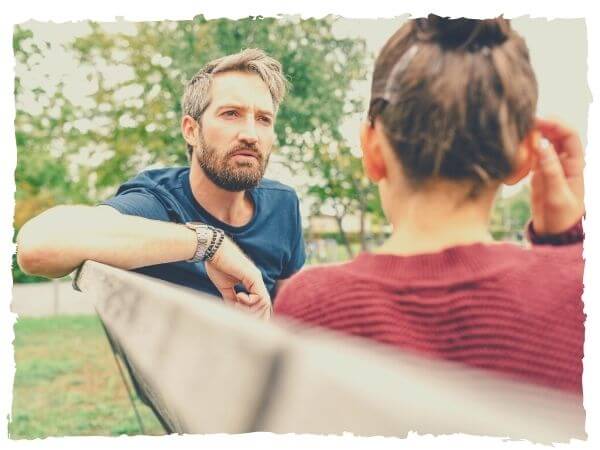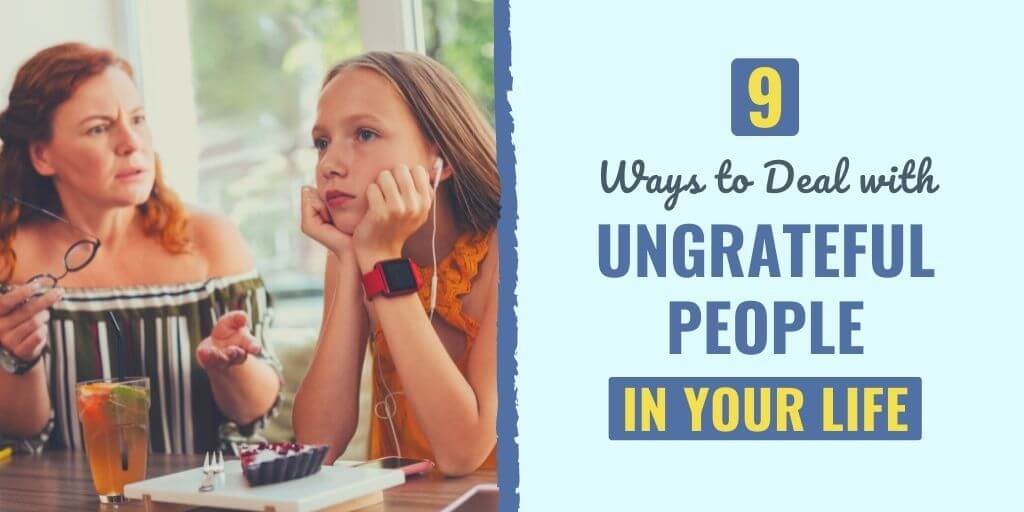Ugh, it’s just happened again. I tried to help my friend Sammy earn extra money working for me after she kicked out her abusive boyfriend… but I kept getting message after message saying she’s not available to work. She was either out with someone or dealing with self-inflicted drama… yet she kept asking for help.
She displays classic signs of an ungrateful person: the world revolves around them and their schedule.
You probably have someone like this in your life. They seem to be everywhere, right? So how can you deal with ungrateful people to minimize their negative impact on you?
What Does Being Ungrateful Mean?
In simple terms, being ungrateful equates to a lack of gratitude. Gratitude is an emotion of feeling grateful or thankful for small things, like a flower blooming, and the big things… like the promotion you just got.
But grateful is also a way of seeing the world, where you see and appreciate positive things. Being ungrateful is the opposite of this.
Many people think ungrateful people are simply those who don’t say “thank you.” However, these people may be grateful, but they struggle to thank someone, or they simply have other ways to show their appreciation.
Still, someone can say “thank you” and not mean it – they simply use it as a way to manipulate others, and this person is actually ungrateful.
Thus, ungratefulness goes beyond words; it’s how someone acts and sees the world. An ungrateful person isn’t thankful, and they can’t notice or appreciate the positive.
How to Tell If Someone Is Ungrateful
There are various ways to tell whether someone is being ungrateful, and not every ungrateful person acts the same.
Here are the 25 telltale signs of a person who isn’t thankful. Ungrateful people:
- Always need help
- Want everything now – demanding much?
- Only have time for you when they need something from you
- Just expect you to be there for them
- Think the world revolves around them – it’s all “I, me, and myself”
- Easily turn on you despite everything you’ve done for them
- Always remember and mention that one time you weren’t there for them
- Always want more
- Are envious
- Are resentful
- Play the victim and never take responsibility
- Have everything handed to them
- Are emotionally unstable and have lots of negative thoughts
- Attract others who are ungrateful
- Live in the past and the future
- Never appreciates anything
- Believe nothing is good enough
- Are selfish
- Judge others
- Never want feedback or constructive criticism
- Complain a lot
- Never support others
- Never apologize
- Spread negativity and ungratefulness
- Make poor choices
Why Are People Ungrateful?
Being grateful is something children learn when they are young. You may think a baby or toddler is completely egocentric, but Barbara Lewis says that babies as young as 15-18 months can begin to understand ideas that lead to gratitude: their mommy and daddy or caretakers do things to make them happy. When your toddler is two or three years old, they express gratitude for material objects, while by the age of four, kids can be thankful for immaterial things like love.
But if children aren’t taught how to value and appreciate others and what they do for them, it can lead to little emperor syndrome. A person who has little emperor syndrome has a self-centered worldview. They believe everyone is there to satisfy their desires and needs.

A person can also be ungrateful if they believe that the world owes them something or they are entitled to it. So they think why be grateful when they deserve it. Another reason people are ungrateful is because they are in too much pain. The struggles they face make it difficult for them to find reasons to be thankful.
Lastly, an unthankful person may also always be dissatisfied with everything because nothing makes them happy. They want better; they want more, and nothing is ever good enough, so why be grateful?
The Effects a Person’s Lack of Gratitude Have on You
If the ungrateful person is a big part of your life, then it’s likely that their lack of gratitude will have a more significant effect on you than dealing with random people like a taxi driver, the cashier behind the till, or the receptionist at the dentist’s office.
Chances are you practice gratitude and consider yourself a grateful person if you are here, reading this article. But we are all human, and we all have moments where we aren’t thankful.
But constantly dealing with ungratefulness can:
9 Steps for Dealing with Ungrateful People
It isn’t easy to deal with an ungrateful person, and this is even truer when the person is a family member, a good friend, or a colleague.
Before I get into the steps for dealing with someone who lacks gratitude and appreciation, remember to always be empathic and don’t force the person to accept something they aren’t ready to admit.
Here are the 9 steps for how you can deal with the ungrateful people in your life:
1. Identify an Ungrateful Person
You may be inclined to think that your coworker who seemingly always asks for help is ungrateful, and especially because they never say thank you. But did you notice that they bring you a delicious Starbucks coffee – your exact order, by the way – and a triple choc chip muffin the next day after you’ve helped them?
Before you decide someone is unthankful, first reflect on what ungrateful means (hint, check out the start of the article) and then see whether the “ungrateful people” in your life match up with the meaning.
An ungrateful person will also repeat their thankless behavior, like a music track that’s stuck on repeat. So pay attention to what people do to help you spot these ungrateful individuals.
2. Create Personal Boundaries
Always being there for ungrateful people will make you feel used. So take a look inward and decide what your boundaries are. Boundaries are your limits or guidelines to help you identify behaviors you consider to be permissible, reasonable, and safe.
Together with deciding what kind of behavior you are okay with, comes how you will deal with behavior that encroaches on your boundaries.

Having healthy boundaries in place (and that you enforce) ensures you don’t feel taken advantage of, taken for granted, or emotionally drained because you can detach yourself and let the ungrateful person fend for themselves.
3. Look at How You React and Revise If Needed
How you react to those who are ungrateful in your life does – unfortunately and unintentionally – gives these people permission to continue treating you the way they are. For example, if you are nodding your head when someone constantly complains, they have tacit permission to continue complaining.
Or what about someone who always asks for help? Do you simply show up and help? If you answer yes, then the ungrateful person gets the message that you are okay with helping them – even willing or eager to help them.
Amending how you react to the behavior of an unthankful person helps you enforce your boundaries and teaches the person what you are and aren’t okay with. Some tips:
4. Have a Chat
If the person plays a big role in your life and it’s important that you get along, you can have a conversation with them about their behavior.
It won’t be an easy conversation, and it’s better to not have expectations that the chat will open their eyes and they’ll change and be all shiny, new, and grateful thereafter.
The person may not know that you feel unappreciated, so find a time to sit down with them. Be calm, use specific examples, don’t lay blame, and simply share – honestly, but kindly – how you feel.
Be prepared that they may get confrontational, accuse you of seeing things, and not apologize, but things can also go the other way.
5. Don’t Label
Calling an ungrateful person “ungrateful” isn’t helping anyone. When you have a conversation with the person about their behavior, labeling them will simply make them deny it and they feel even less inclined to hear you out.
So rather focus how their behavior makes you feel.
What do you feel when they always shift blame? When they show up when they need you but are MIA when you need them? When they are always complaining?
During the conversation, be sure to use “I” statements like “I feel that you don’t appreciate my help when …”
6. Analyze Your Intent for Doing Something
Looking at your intent or expectations for why you do what you do gives you a new perspective on ungratefulness.
We typically do things for people because:
If you do something for someone without any expectation, the value of ungratefulness decreases because you aren’t helping to receive gratitude from someone. You are helping because it’s right and you want to.
So whether someone thanks you is irrelevant. A thank you is still nice and appreciated, but not getting one won’t annoy you or make you feel used.
7. Be Compassionate
Put yourself in the unthankful person’s shoes. Maybe you don’t even know what they are going through, but that doesn't mean you can’t be compassionate.
Your sister may be ungrateful of you babysitting the kids because she just found out her husband is cheating. Or your coworker may seem ungrateful when you show them how to do that Excel formula – again – because their mom just passed away.

People get wrapped up in their struggles and forget to show gratitude, but give them the benefit of the doubt if it isn’t a pattern.
A toxic person, on the other hand, is ungrateful, period. They don’t know how not to be, whether they are experiencing challenges or not.
8. Continue Practicing Gratitude
Just because people in your life are thankless, doesn’t mean their negativity should spread and invade your life. Unfortunately, that can very easily happen.
One way to prevent becoming like the toxic, ungrateful people in your life is to continuously practice gratitude so you can reap the many positive benefits:
9. Put Yourself First and Let Go
It isn’t easy to say goodbye and let go of someone you are used to having in your life and when they are a big part of it. But you have to prioritize you, and sometimes, that means saying goodbye to the ungrateful person.
You can’t make the person change, and continuing to hang around an energy vampire or toxic person only affects you negatively. Decide when enough is enough, and put your happiness (and sanity) first.
Final Thoughts on Dealing with Ungrateful People
No one likes putting up with ungrateful people and feeling like they’re being taken for granted or used all the time. This can lead to feelings of low self-esteem and self-doubt within yourself that are unjustified and counterproductive.
It may seem challenging to deal with those who are unthankful, but following the steps I’ve outlined above will improve your life as you become more self-aware, do without expectation, set healthy boundaries and let go of toxic people when needed.
Why not look at these best gratitude journals to continue your gratitude journey and lessen the effect of ungrateful energy vampires?


